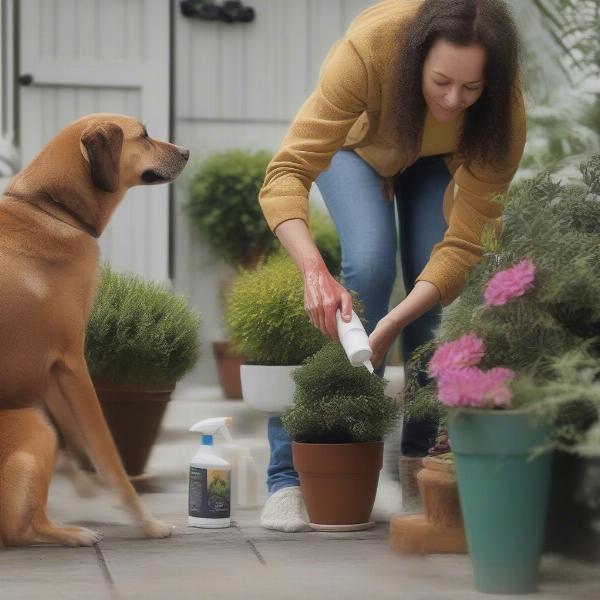Dealing with a dog that consistently uses your prized plants as a toilet can be frustrating. This behavior can damage your garden and create an unpleasant smell. Understanding why dogs urinate on plants and implementing effective strategies can help you address this issue and restore harmony to your home and garden. This guide provides practical solutions and expert advice on how to keep dogs from urinating on plants.
Understanding the Reasons Behind Plant Urination
Before tackling the problem, it’s important to understand why dogs urinate on plants. While it might seem like deliberate mischief, there are several underlying reasons for this behavior. Marking territory is a primary instinct. Dogs use urine to communicate their presence and establish their territory. Plants, especially those with vertical surfaces, offer a convenient “signpost” for this purpose. Additionally, the scent of certain fertilizers or even the plants themselves can attract dogs. Sometimes, inadequate potty training or medical conditions like urinary tract infections can also contribute to inappropriate urination. Lastly, anxiety or stress can manifest in undesirable behaviors, including urinating on plants.
Effective Strategies to Prevent Plant Urination
Several strategies can deter dogs from urinating on plants. Creating a designated potty area is crucial. Consistent training reinforces where it’s appropriate to relieve themselves. Positive reinforcement with treats and praise when they use the designated area helps solidify the habit. Dog deterrent sprays can be applied around plants. These sprays contain natural ingredients that create an unpleasant smell for dogs, discouraging them from approaching the area.
 Dog Deterrent Spray for Plants
Dog Deterrent Spray for Plants
Creating a Dog-Friendly Garden
Designing a dog-friendly garden involves considering your dog’s needs and behaviors. Choosing dog-repellent plants can naturally deter them from certain areas. Plants like rue, citronella, and lavender have strong scents that dogs tend to avoid. Providing alternative “marking posts” like rocks or designated posts can redirect their marking behavior. Ensuring your dog gets sufficient exercise and mental stimulation can minimize boredom and anxiety, which can contribute to unwanted behaviors.
Addressing Underlying Medical or Behavioral Issues
If the problem persists, consulting a veterinarian is essential. Underlying medical conditions, such as urinary tract infections, can cause increased urination. A veterinarian can diagnose and treat these issues. If medical reasons are ruled out, seeking guidance from a certified dog trainer or behaviorist can provide tailored strategies to address any underlying behavioral issues contributing to the plant urination. They can help you understand your dog’s specific triggers and develop a personalized training plan.
Conclusion
Preventing dogs from urinating on plants requires a multi-pronged approach. Understanding the underlying reasons, implementing deterrents, creating a dog-friendly environment, and addressing any medical or behavioral issues are all crucial steps. With patience, consistency, and the right strategies, you can protect your plants and create a harmonious environment for both you and your furry friend. Remember, addressing this issue promptly is key to preventing long-term habits and preserving your garden.
FAQ
- Why does my dog suddenly start urinating on plants? Changes in behavior could indicate medical issues, stress, or changes in the environment. A vet check is recommended.
- Are dog deterrent sprays safe for my plants? Choose sprays specifically designed for use around plants to avoid harming them.
- What are some dog-repellent plants I can use? Rue, citronella, and lavender are known to deter dogs with their strong scents.
- How can I create a designated potty area for my dog? Choose a specific spot in your yard, make it easily accessible, and consistently take your dog there for potty breaks.
- When should I consult a veterinarian or dog trainer? If the problem persists despite your efforts, or if you suspect a medical or behavioral issue, it’s time to seek professional help.
- Can anxiety cause a dog to urinate inappropriately? Yes, stress and anxiety can manifest in various ways, including changes in urination habits.
- How can I make my garden more dog-friendly? Choose dog-repellent plants, provide alternative marking posts, and ensure your dog gets enough exercise.
Related Articles on ILM Dog
ILM Dog is your trusted resource for expert dog care advice. We offer comprehensive guidance on dog breeds, health, training, nutrition, grooming, and much more. Whether you’re a new dog owner or a seasoned expert, our articles provide valuable insights to help you provide the best possible care for your canine companion. From puppy care to senior dog care, we cover every stage of your dog’s life. Explore our website for more tips on creating a happy and healthy life for your dog. Contact us at [email protected] or +44 20-3965-8624 for personalized advice. ILM Dog is here to support you on your dog parenting journey.